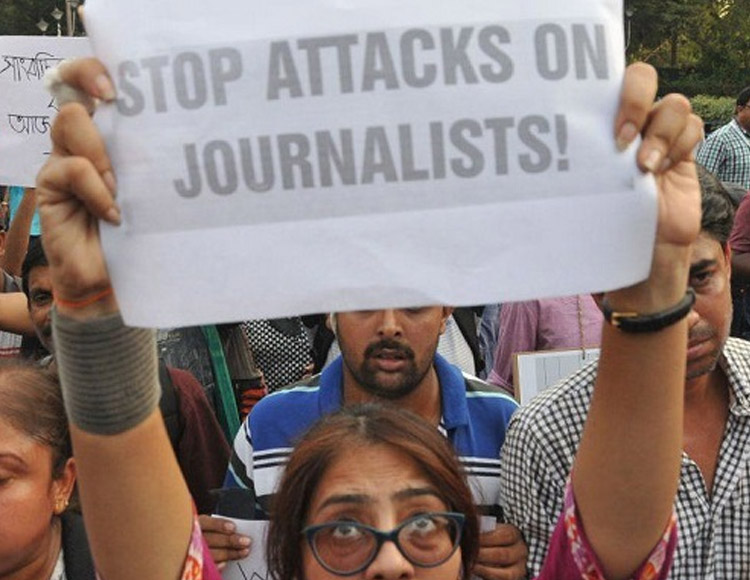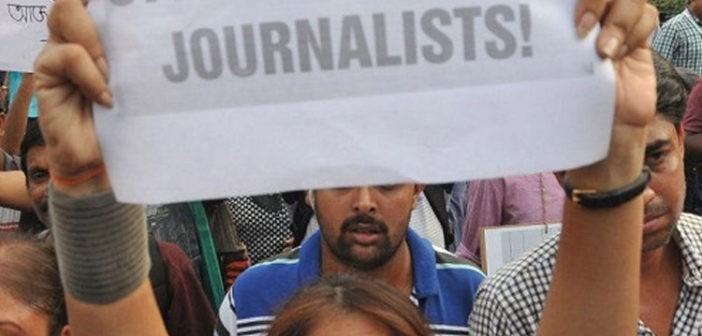
 In its unabashed frenzy to subjugate all dissent and penalise all dissidents, India’s right-wing Bharatiya Janata Party (BJP) government recently took yet another step towards curtailing the freedom of speech and expression guaranteed by the country’s Constitution.
In its unabashed frenzy to subjugate all dissent and penalise all dissidents, India’s right-wing Bharatiya Janata Party (BJP) government recently took yet another step towards curtailing the freedom of speech and expression guaranteed by the country’s Constitution.
Disregarding global reproach for its continued assaults on democracy, the government passed its Information Technology (Guidelines for Intermediaries and Digital Media Ethics Code) Rules, 2021, that aim at regulating the social media intermediaries, over-the-top (OTT) platforms, and online news and current affairs websites. OTT platforms offer a range of online media services directly to viewers and include Netflix, Amazon Prime Video, DirecTV Now, fuboTV, Sling TV, Hulu with Live TV, PlayStation Vue, MercTV, YouTube Premium and YouTube TV.
The public in India, as the world over, believes that digital media have given them a voice and thus empowered them to express themselves on issues that affect them. There are 530 million WhatsApp users in India, apart from 448 million users of YouTube, 410 million of Facebook, 210 million of Instagram, and 17.5 million of Twitter.
The Rules, prescribing a code of ethics and a three-tier content regulation mechanism, have been framed under the Information Technology (IT) Act, 2000, and in supersession of the earlier IT (Intermediary Guidelines) Rules, 2011.
The government claimed that the Rules were finalised by both the Ministries of Electronics and IT, and of Information and Broadcasting, which “undertook elaborate consultations among themselves in order to have a harmonious, soft-touch oversight mechanism in relation to social media platforms as well as digital media and OTT platforms etc”. The statement inadvertently acknowledged that no stakeholders – neither the media service providers nor the end users – were consulted in framing the Rules.
Stressing that “the proposed framework is progressive, liberal and contemporaneous”, the Ministries declared that while social media platforms were welcome to do business in India, they would “need to follow the Constitution and laws of India”.
The Rules have given rise to much concern. For instance, they stipulate that digital and online media will be guided by a Code of Ethics. This Code will apply to publishers of online curated content and intermediaries, requiring them to exercise caution when deciding to feature any content on their platforms. They will need to consider whether such content affects the sovereignty and integrity of India, threatens, endangers or jeopardises the security of the State, or is detrimental to India’s friendly relations with foreign countries, and to India’s multi-racial and multi-religious context.
Rule 5(2) obliges the social media intermediaries, involved in providing messaging services, to assist law enforcement agencies in identifying and tracking the first originator of “any contentious or problematic information”. It is left to government agents or agencies to deem any social message “contentious or problematic information” and thereby have its “originator” traced by the “enforcement mechanism”.
While the rule ostensibly attempts to curb the spread of fake news and illegal activities over messaging applications, cyber experts fear that this will eventually result in overriding end-to-end encryption, allowing for the formation of a surveillance state that can breach privacy at will. This and many other provisions of these IT Rules of 2021 also treats many offences as violative of the “sovereignty, integrity and security of the State”. Considering that the government has been acting against numerous persons on these grounds by equating itself with the State, even at times suffering judicial rebuke on this score, such provisions in the new legislation can lead to gross misuse of such wide and discretionary powers.
Legal expert, Vijay Pal Dalmia, Partner of Vaish Associates Advocates, notes: “While analysing the grievance redressal mechanism, the executive has been authorised to rule over the suitability of content published by the media through the Oversight Mechanism, an unprecedented move that may be perceived as ultra vires of the Constitution. The inter-ministerial committee of bureaucrats has been granted the authority to adjudicate on matters relating to free speech and journalistic freedoms, which may in turn prove not to be conducive for the same.”
The IT Rules have been challenged by the independent online news portal, The Wire, which has contended before the Delhi High Court that the legislation is “palpably illegal in seeking to control and regulate digital news media, when the parent statute IT Act nowhere provides for such a remit”. The plea maintained that the Rules will have profound and serious harm for digital news media, like the petitioner, and sought to have them declared “void and inoperative insofar as they define and apply to publishers of news and current affairs content”.
Incidentally, The Wire founding editor Siddharth Varadarajan faces prosecution from the Uttar Pradesh police – the state being ruled by the BJP – for posting a “provocative” tweet regarding the death of a farmer during the farmers’ protest rally in Delhi on 26 January, Republic Day. Varadarajan had tweeted about a story in The Wire where the grandfather of the deceased farmer was quoted as alleging that a doctor on the panel that conducted the postmortem had informed him, on condition of anonymity, that his grandson had actually died of a bullet injury.
The police charges against the editor were registered under Sections of 153 B (imputations, assertions prejudicial to national integration) and 505 (2) (inciting any class or community for violence), leading Nobel Economics Laureate Amartya Sen to note in a commentary on this episode: “India’s hard-fought democratic rights are at risk because of striking misuse of political power by the ruling party.” He added: “As a proud Indian citizen, I have to hang my head in shame at the gross misbehaviour of our elected leaders – both for their attempt to curb media independence and for their efforts to violate freedom of speech in the country. While recording my condemnation of this particular case – and demanding that the charges of criminality be immediately withdrawn – I cannot but reflect on the general subject of the decline of democratic freedom in my country.”
On The Wire’s case against the IT Rules, the Delhi High Court on 9 March sought the Central government’s response. The Court issued notices to the two concerned Ministries and granted them time to file their response.






